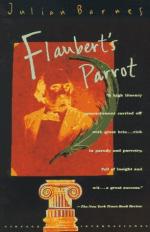|
This section contains 225 words (approx. 1 page at 400 words per page) |

|
Barnes' most useful technique for making Flaubert's Parrot a success is his blending of scholarly and entertaining elements.
The novel is alternately funny, sad, and encyclopedic. Long discussions of Flaubert's body of work and literary connections are relieved by Braithwaite's sad confessions regarding his wife and his hilarious tendency to poke fun at academics, his countrymen and himself.
Barnes' brand of humor is rather unorthodox. The humor in Flaubert's Parrot is closer to Thomas Pynchon's than to humorist Dave Barry's. Barnes demands of his reader a substantial understanding and knowledge of literary history. More specifically, Barnes' ideal reader is one with a love of French literature who understands the nuances in his discussion of Flaubert's life and foils.
Barnes clearly knows the annals of French literature. His ability to weave his clearly extensive research of Flaubert's life and work into the narrative is one of his most important...
|
This section contains 225 words (approx. 1 page at 400 words per page) |

|




